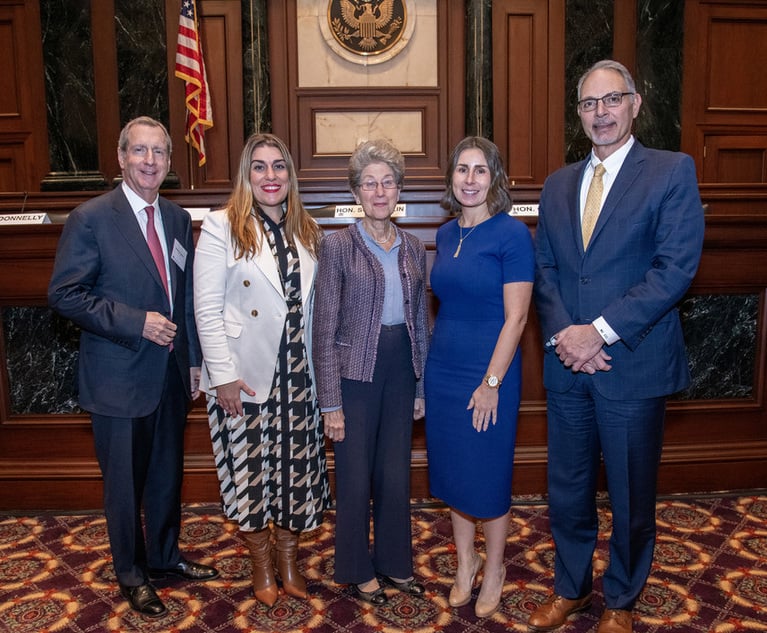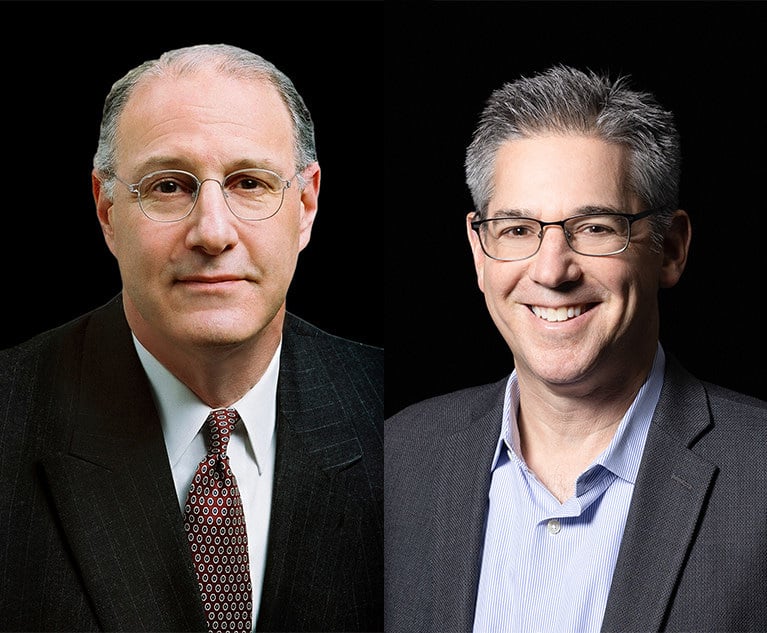 New York State Sen. Todd Kaminsky, D-Nassau (Courtesy photo)
New York State Sen. Todd Kaminsky, D-Nassau (Courtesy photo)Effort to Close Double Jeopardy 'Loophole' in NY Revived in New Session
State Sen. Todd Kaminsky, D-Nassau, is carrying a bill aimed at giving state law enforcement officers, including those in the office of new Attorney General Letitia James, the option to prosecute individuals who receive a presidential pardon before they are tried for federal crimes.
January 03, 2019 at 03:08 PM
6 minute read
Legislation in New York to close the double jeopardy “loophole,” which bars state prosecutors from bringing similar charges against individuals pardoned of federal charges by the president of the United States, was reintroduced in the Legislature this week.
The bill is aimed at giving state law enforcement officers, including those in the office of new Attorney General Letitia James, the option to prosecute individuals who receive a presidential pardon before they are tried for federal crimes.
State Sen. Todd Kaminsky, D-Nassau, first introduced the bill during last year's legislative session and will carry it again in 2019. It was blocked last year in the Senate by Republicans, who largely labeled it as a political attack on President Donald Trump rather than a necessary change to the state's criminal procedure law.
The bill is more likely to pass in the Senate this year after Democrats won a firm majority in the chamber during last year's general election. It's the first time Democrats will control the state Senate in nearly a decade. The party has held the Assembly consistently for decades.
But one-party control of both houses of the Legislature does not mean Kaminsky's bill will be a slam-dunk this session. Democrats in the Assembly did not unanimously support the bill last year, and Kaminsky said he still needs to speak to the new members of his conference about the legislation.
While the bill was a top priority for him last year, Kaminsky said the gravity of its consequences have grown since the previous legislative session.
“I think the president, the way he speaks about pardons and the way he speaks about the investigation that swirls around him should give us all cause for concern,” Kaminsky said. “Every day this bill is not law, we are potentially taking options off the table for holding him and other presidents accountable who want to flout the rule of law. I think it takes on even greater importance as we move into the new session.”
That's because the legislation would not apply to individuals pardoned by the president after their trial on federal charges begins. Double jeopardy, which prevents state charges based on an identical set of facts used to bring federal charges, is attached at the start of the trial.
Take the case of Paul Manafort, the former chairman of Trump's presidential campaign. He was convicted on federal charges of fraud unrelated to the campaign, but could still receive a pardon from Trump. Even if the president decided to grant him clemency, state prosecutors in New York would be barred from bringing their own charges because double jeopardy had already been applied.
That was one of two cases that prompted Gov. Andrew Cuomo to voice his support for the legislation earlier this year. The other was the guilty plea of Michael Cohen, Trump's former attorney.
“New York must have the ability to stand up against the abuse of power,” Cuomo said at the time. “I call on the State Legislature to amend current State law to close the double jeopardy loophole and ensure that these wrongdoers cannot escape justice—I will sign it into law the same day.”
The legislation also has been strongly supported by James, a Democrat who said last year she would advocate for the bill while in office. James has been clear that she intends to place a microscope over Trump and his family in any way that the state's chief law enforcement office can. Attorneys under James would need a criminal referral from an appropriate state agency to begin a criminal investigation into any of those individuals.
She repeated her support for the bill earlier this week during an inauguration ceremony on Ellis Island.
“I will work in a legal system where even the most powerful federal official in the country cannot use a loophole to evade justice,” James said.
But some Democrats in the Legislature interpret the bill as too vague in its current form. There are concerns that removing the so-called double jeopardy loophole could backfire at some point down the line, regardless of its intention to hold Trump and future presidents accountable for their choices in clemency.
Consider a scenario where an individual who faces charges related to an act of civil disobedience is pardoned by a president in the future after public pressure to prevent federal prosecutors from moving forward with the case. Under the current bill, a state prosecutor in New York could bring state charges against that individual based on the same set of facts.
That's the kind of situation Democrats who are reluctant to support the bill want to avoid. Assemblyman Joe Lentol, a Democrat from Brooklyn who sponsored the bill last year, said in a previous interview that members of his conference may be more likely to support the legislation if it was more specific about which crimes would be addressed.
“I think we could do this and really make matters worse for people who are in a situation to get pardoned and have to get retried again,” Lentol said. “I think that these unintended consequences need to be vetted before we move forward.”
Kaminsky said conversations on how the bill could be changed to win the support of those members will begin at the start of this year's session, which begins next week. With the Senate previously in Republican hands, there wasn't much use in getting into the weeds on the legislation. This year, Kaminsky said, he plans to hear out the concerns of other Democrats and see if they can be addressed somehow in the legislation.
“I expect those to happen shortly. Obviously the in-depth conversations didn't have to happen last year because it was clear a Republican Senate wasn't going to act on it,” Kaminsky said. “I think we have to take those concerns seriously and work with all of our partners, including the executive, to work on this.”
Kaminsky already has a strong ally on the legislation in the Senate. Sen. Jamaal Bailey, a Democrat from the Bronx and the new chair of the Codes Committee, is a co-sponsor of the bill. That committee will have to review the legislation before it heads to the Senate floor for a vote. That's not necessarily a bellwether, though. Lentol chairs his chamber's Codes Committee, which did not move the bill last year.
Lawmakers will return to Albany to begin this year's legislative session on Jan. 9.
READ MORE:
This content has been archived. It is available through our partners, LexisNexis® and Bloomberg Law.
To view this content, please continue to their sites.
Not a Lexis Subscriber?
Subscribe Now
Not a Bloomberg Law Subscriber?
Subscribe Now
NOT FOR REPRINT
© 2024 ALM Global, LLC, All Rights Reserved. Request academic re-use from www.copyright.com. All other uses, submit a request to [email protected]. For more information visit Asset & Logo Licensing.
You Might Like
View All
Big Law Partner Presented With State Bar's Scheindlin Award

'A World of Credit': Ex-FTX Executive Gary Wang Sentenced to Time Served Following Cooperation

Manhattan Prosecutors Say They Will Oppose Efforts by Trump Legal Team to Dismiss Case
Trending Stories
Who Got The Work
Michael G. Bongiorno, Andrew Scott Dulberg and Elizabeth E. Driscoll from Wilmer Cutler Pickering Hale and Dorr have stepped in to represent Symbotic Inc., an A.I.-enabled technology platform that focuses on increasing supply chain efficiency, and other defendants in a pending shareholder derivative lawsuit. The case, filed Oct. 2 in Massachusetts District Court by the Brown Law Firm on behalf of Stephen Austen, accuses certain officers and directors of misleading investors in regard to Symbotic's potential for margin growth by failing to disclose that the company was not equipped to timely deploy its systems or manage expenses through project delays. The case, assigned to U.S. District Judge Nathaniel M. Gorton, is 1:24-cv-12522, Austen v. Cohen et al.
Who Got The Work
Edmund Polubinski and Marie Killmond of Davis Polk & Wardwell have entered appearances for data platform software development company MongoDB and other defendants in a pending shareholder derivative lawsuit. The action, filed Oct. 7 in New York Southern District Court by the Brown Law Firm, accuses the company's directors and/or officers of falsely expressing confidence in the company’s restructuring of its sales incentive plan and downplaying the severity of decreases in its upfront commitments. The case is 1:24-cv-07594, Roy v. Ittycheria et al.
Who Got The Work
Amy O. Bruchs and Kurt F. Ellison of Michael Best & Friedrich have entered appearances for Epic Systems Corp. in a pending employment discrimination lawsuit. The suit was filed Sept. 7 in Wisconsin Western District Court by Levine Eisberner LLC and Siri & Glimstad on behalf of a project manager who claims that he was wrongfully terminated after applying for a religious exemption to the defendant's COVID-19 vaccine mandate. The case, assigned to U.S. Magistrate Judge Anita Marie Boor, is 3:24-cv-00630, Secker, Nathan v. Epic Systems Corporation.
Who Got The Work
David X. Sullivan, Thomas J. Finn and Gregory A. Hall from McCarter & English have entered appearances for Sunrun Installation Services in a pending civil rights lawsuit. The complaint was filed Sept. 4 in Connecticut District Court by attorney Robert M. Berke on behalf of former employee George Edward Steins, who was arrested and charged with employing an unregistered home improvement salesperson. The complaint alleges that had Sunrun informed the Connecticut Department of Consumer Protection that the plaintiff's employment had ended in 2017 and that he no longer held Sunrun's home improvement contractor license, he would not have been hit with charges, which were dismissed in May 2024. The case, assigned to U.S. District Judge Jeffrey A. Meyer, is 3:24-cv-01423, Steins v. Sunrun, Inc. et al.
Who Got The Work
Greenberg Traurig shareholder Joshua L. Raskin has entered an appearance for boohoo.com UK Ltd. in a pending patent infringement lawsuit. The suit, filed Sept. 3 in Texas Eastern District Court by Rozier Hardt McDonough on behalf of Alto Dynamics, asserts five patents related to an online shopping platform. The case, assigned to U.S. District Judge Rodney Gilstrap, is 2:24-cv-00719, Alto Dynamics, LLC v. boohoo.com UK Limited.
Featured Firms
Law Offices of Gary Martin Hays & Associates, P.C.
(470) 294-1674
Law Offices of Mark E. Salomone
(857) 444-6468
Smith & Hassler
(713) 739-1250







